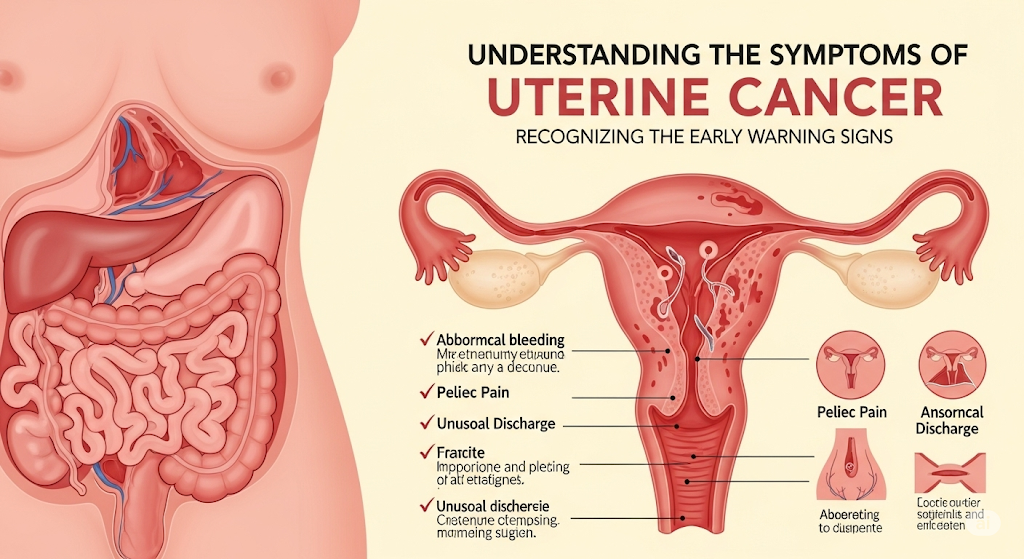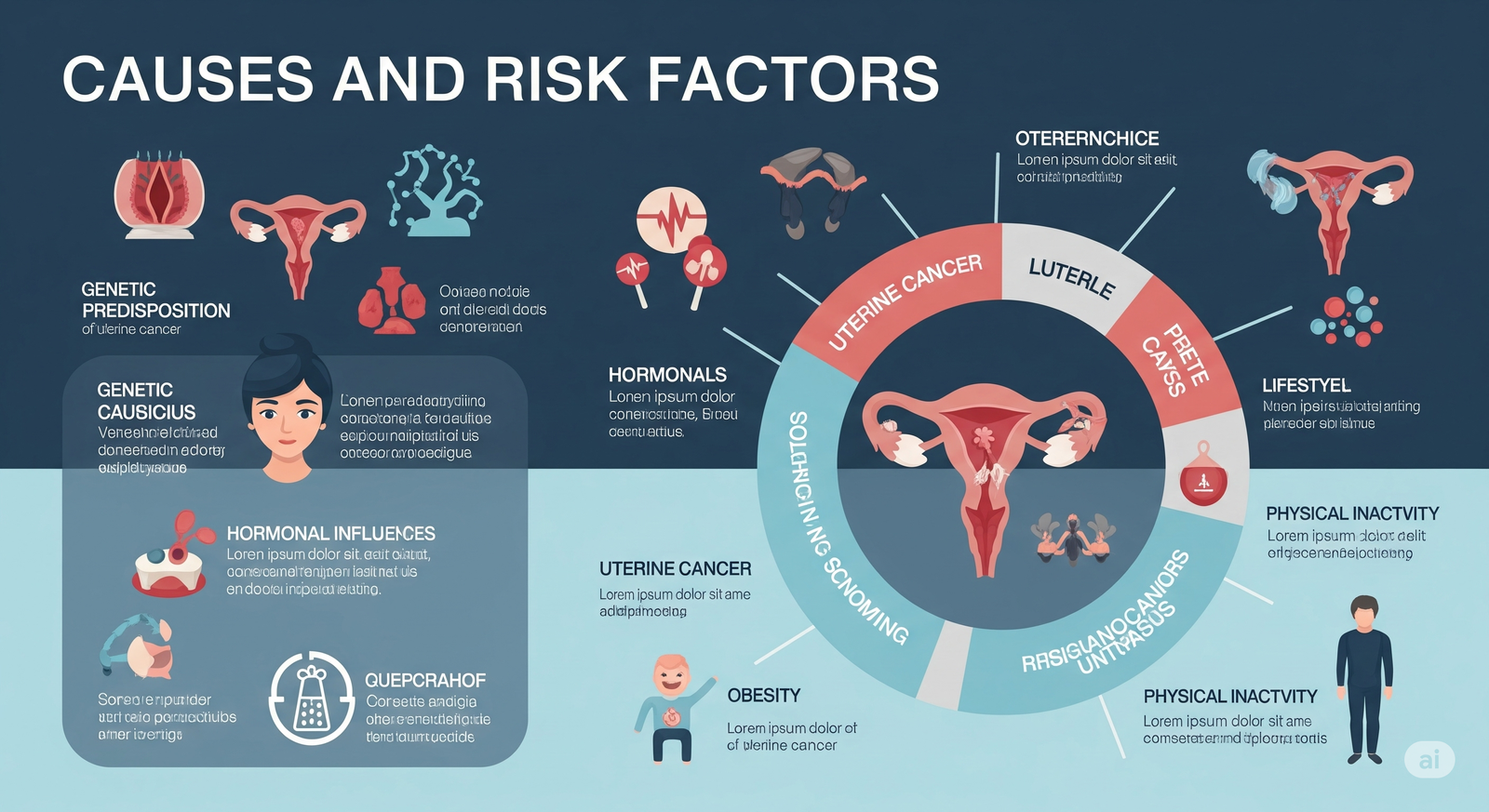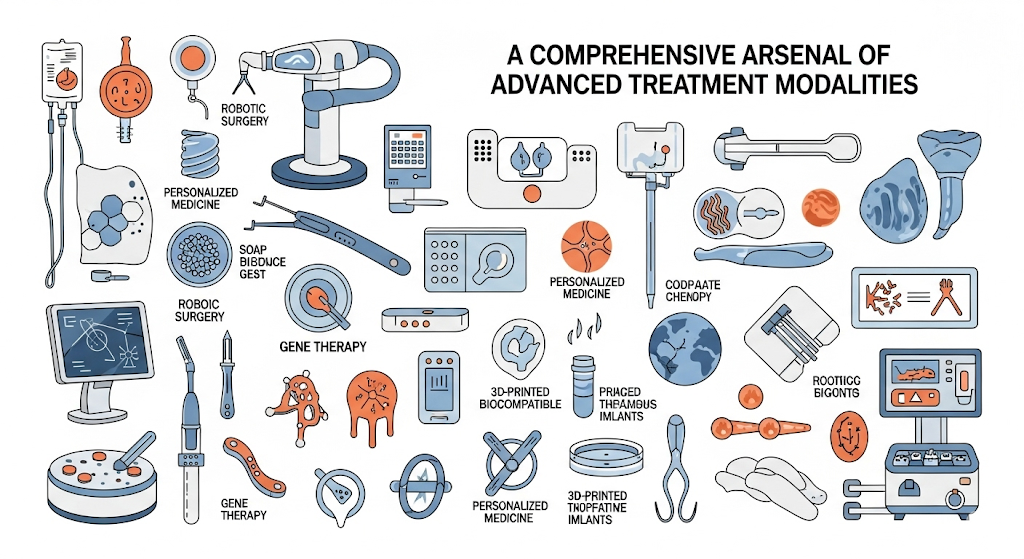Uterine Cancer Treatment in Bikaner
Uterine cancer, a malignancy originating in the uterus, stands as one of the most prevalent gynecologic cancers, particularly affecting postmenopausal women. As public health awareness and accessibility to advanced medical services improve, the early detection of this condition has become increasingly common. In a significant stride for healthcare in Rajasthan, the landscape of Uterine Cancer Treatment in Bikaner has undergone a remarkable transformation. This evolution offers renewed hope and high-quality care to women diagnosed with uterine cancer, eliminating the need for them to travel to distant metropolitan centers. At the forefront of this change is the esteemed Dr Rahul Rai, widely regarded as the Best Oncologist in Bikaner.
His dedicated clinic has emerged as a sanctuary of healing and support, solidifying his reputation as a trusted Cancer Doctor Bikaner. In this article, you will also see Causes and Risk Factors of Uterine Cancer.
The incidence of uterine cancer is on an upward trend, a phenomenon attributable to increased life expectancy, evolving lifestyles, and a greater prevalence of hormonal imbalances. The uterus, a vital organ in the female reproductive system, is subject to numerous changes throughout a woman’s life. The most common form of uterine cancer, endometrial cancer, arises from the uncontrolled proliferation of cells in the uterine lining, known as the endometrium.
Less frequent are uterine sarcomas, which develop from the muscle or other tissues of the uterus. Dr. Rahul Rai consistently emphasizes the paramount importance of timely diagnosis, as early-stage uterine cancer is not only highly treatable but often curable.
Through comprehensive patient education, prompt and accurate diagnostics, and a holistic approach to care, Dr. Rahul Rai is redefining the standards of Uterine Cancer Treatment in Bikaner. His clinic is more than just a medical facility; it is a source of immense strength and unwavering support for women navigating the challenging journey of a cancer diagnosis.
Understanding the Symptoms of Uterine Cancer: Recognizing the Early Warning Signs
Vigilance for the signs and symptoms of uterine cancer is crucial for early intervention. While in some instances the early stages of the disease may be asymptomatic, many women experience indicators that warrant a medical consultation. These symptoms can often mimic those of other, less severe gynecologic conditions, making a professional evaluation by a qualified medical expert absolutely essential.

Abnormal Vaginal Bleeding: This is the most definitive and common symptom of uterine cancer. It can manifest as any bleeding after menopause, bleeding or spotting between menstrual periods, or an unusually heavy menstrual flow. Any post-menopausal bleeding should be considered a significant red flag and investigated immediately.
Pelvic or Lower Abdominal Pain: Persistent discomfort or pain in the pelvic region or lower abdomen that does not resolve or worsens over time can be an indicator of an underlying issue within the uterus.
Pain During Sexual Intercourse (Dyspareunia): While often overlooked or attributed to other causes, pain during intercourse can be associated with uterine abnormalities, including cancer.
Watery or Blood-Tinged Vaginal Discharge: Any unusual vaginal discharge that is not part of the normal menstrual cycle, particularly if it is watery, has a foul odor, or is tinged with blood, requires a thorough medical examination.
Persistent Fatigue: As with many forms of cancer, uterine cancer can lead to a pervasive sense of tiredness and fatigue. This can be a result of internal bleeding leading to anemia or the body’s inflammatory response to the malignancy.
Unexplained Weight Loss: A sudden and unintentional loss of weight, especially in older women, can be a sign of cancer progression and should not be dismissed.
Changes in Urinary Habits: A growing uterine tumor can exert pressure on the bladder, leading to symptoms such as increased frequency of urination or a persistent sense of urgency.
It is imperative to understand that while these symptoms can be associated with non-cancerous conditions such as fibroids, polyps, or infections, they should never be ignored. Seeking an early consultation with a knowledgeable Cancer Doctor Bikaner like Dr. Rahul Rai can facilitate a swift and accurate diagnosis, paving the way for prompt and effective treatment.
Delving into the Causes and Risk Factors of Uterine Cancer
A comprehensive understanding of the etiological factors behind uterine cancer is instrumental in both prevention and early detection. The development of this cancer is typically multifactorial, involving a complex interplay of lifestyle choices, hormonal influences, and genetic predispositions.

Lifestyle and Hormonal Risk Factors:
- Obesity and Overweight: Adipose (fat) tissue is a significant site of estrogen production. Excess body fat can lead to higher levels of circulating estrogen, which can overstimulate the endometrium, increasing the risk of cancerous growth.
- Hormonal Imbalances: A key factor in the development of endometrial cancer is an imbalance between estrogen and progesterone. Conditions where estrogen levels are high without the counterbalancing effect of progesterone can lead to endometrial hyperplasia, a precursor to cancer.
- Lack of Physical Activity: A sedentary lifestyle is often linked to obesity and metabolic syndrome, both of which are independent risk factors for uterine cancer.
- Dietary Habits: A diet high in red and processed meats has been associated with increased inflammation and hormonal disruption, potentially contributing to a higher risk of uterine cancer.
- Unopposed Estrogen Therapy: The use of estrogen replacement therapy without the concurrent administration of progesterone is a well-established risk factor for endometrial cancer.
- Nulliparity (Having No Children): Women who have never been pregnant may have a higher risk due to more prolonged and uninterrupted exposure to estrogen over their lifetime.
Medical and Genetic Risk Factors:
- Early Menarche and Late Menopause: The onset of menstruation before the age of 12 or the commencement of menopause after the age of 55 extends a woman’s reproductive lifespan, leading to a longer duration of estrogen exposure.
- Polycystic Ovary Syndrome (PCOS): Women with PCOS often experience irregular or absent ovulation, resulting in chronically high estrogen levels that are not balanced by progesterone.
- Diabetes Mellitus: Type 2 diabetes, which is frequently associated with obesity, is a significant risk factor for uterine cancer.
- Lynch Syndrome (Hereditary Nonpolyposis Colorectal Cancer): This inherited genetic condition markedly increases the risk of developing several types of cancer, including uterine, colorectal, and ovarian cancers.
- Previous History of Breast or Ovarian Cancer: A personal history of breast or ovarian cancer can increase the risk of uterine cancer, either due to shared genetic risk factors or as a consequence of certain cancer treatments, such as tamoxifen.
- Pelvic Radiation Therapy: Prior radiation treatment to the pelvic area for other cancers can lead to cellular changes in the uterine tissue, increasing the risk of a secondary malignancy.
Women who identify with one or more of these risk factors should be particularly diligent about regular health check-ups and should not hesitate to seek an expert evaluation from a qualified Cancer Doctor Bikaner.
The Vanguard of Uterine Cancer Treatment in Bikaner: Dr Rahul Rai
When it comes to receiving personalized, state-of-the-art Uterine Cancer Treatment in Bikaner, the name of Dr Rahul Rai resonates with trust and excellence. Widely acknowledged as the Best Oncologist in Bikaner, Dr. Rai brings to his practice an invaluable blend of profound knowledge, extensive experience, and deep-seated empathy. His unwavering commitment has been instrumental in transforming the landscape of oncology care in the region.
Dr. Rai’s distinguished academic and professional journey laid a strong foundation for his expertise. After completing his MBBS, he pursued an MD in Radiation Oncology from the prestigious Sardar Patel Medical College (SPMC) in Bikaner. His relentless pursuit of excellence then led him to the revered Tata Memorial Hospital in Mumbai, India’s apex institution for cancer care and research, where he obtained a DM in Medical Oncology.
During his tenure as an Assistant Professor at Tata Memorial Hospital, Dr. Rai honed his skills in managing a wide spectrum of complex cancer cases, with a special focus on gynecologic malignancies. With over a decade of rich experience, he is now dedicated to serving his community in Bikaner, offering the same high standards of care that are available in India’s leading metropolitan cities.
At the heart of Dr. Rai’s treatment philosophy is a patient-centric approach that seamlessly integrates clinical excellence with compassionate emotional support. He firmly believes that every patient is unique and deserves a tailored treatment plan that is meticulously crafted to align with her specific cancer stage, age, fertility aspirations, and overall health status.
A Comprehensive Arsenal of Advanced Treatment Modalities:
The treatment of uterine cancer is highly individualized and often involves a multidisciplinary approach. Dr Rahul Rai’s clinic offers a comprehensive suite of advanced treatment options:

- Surgical Oncology: Surgery remains the cornerstone of treatment for most uterine cancers. The standard procedure is a total hysterectomy (removal of the uterus and cervix), often accompanied by a bilateral salpingo-oophorectomy (removal of both ovaries and fallopian tubes). In many cases, a pelvic and sometimes para-aortic lymph node dissection is also performed to assess the extent of cancer spread. For suitable candidates, minimally invasive techniques such as laparoscopic and robotic-assisted surgery are available, offering the benefits of smaller incisions, less pain, and a quicker recovery.
- Chemotherapy: For patients with advanced-stage uterine cancer, aggressive histological subtypes, or recurrent disease, chemotherapy is a vital treatment modality. Dr. Rai prescribes chemotherapy regimens that typically include a combination of platinum-based drugs (like cisplatin or carboplatin) and taxanes (like paclitaxel). These regimens are carefully customized to maximize efficacy while managing potential side effects.
- Radiation Therapy: Adjuvant radiation therapy may be recommended after surgery to reduce the risk of the cancer recurring in the pelvic area. Advanced techniques such as External Beam Radiation Therapy (EBRT) and Vaginal Brachytherapy (a form of internal radiation) are employed to deliver a precise dose of radiation to the target area while minimizing exposure to surrounding healthy tissues.
- Hormonal Therapy: For uterine cancers that are hormone receptor-positive, or for patients who are not suitable candidates for surgery, hormonal therapy can be an effective treatment. This approach uses progestins or other hormonal agents to slow the growth of cancer cells.
- Targeted Therapy: The field of oncology is rapidly advancing with the development of targeted therapies. These are newer drugs that work by blocking specific molecular pathways that are involved in the growth and spread of cancer cells. These treatments, often used in combination with chemotherapy, offer new hope for better control of resistant or advanced tumors.
- Immunotherapy: Immunotherapy represents a revolutionary approach to cancer treatment. For advanced uterine cancers that exhibit specific molecular characteristics, such as being microsatellite instability-high (MSI-H) or having a defect in mismatch repair (dMMR), checkpoint inhibitors can be recommended. Dr Rahul Rai remains at the forefront of these advancements, staying abreast of the latest FDA approvals and clinical trial data to offer his patients evidence-based immunotherapy options.
- Fertility-Sparing Options: For younger women who are diagnosed with early-stage, low-grade endometrial cancer and wish to preserve their fertility, a conservative management approach using hormonal therapy under very close and careful surveillance may be a viable option.
- Palliative and Supportive Care: Dr Rahul Rai and his team place a strong emphasis on holistic care. For patients with advanced disease, a comprehensive palliative care plan is integrated into their treatment to manage pain, provide nutritional support, and address their psychological and emotional well-being.
This integrated and compassionate approach to treatment is what makes Dr Rahul Rai’s clinic a trusted and leading center for Uterine Cancer Treatment in Bikaner. His presence has not only elevated the quality of cancer care available locally but has also brought a renewed sense of hope and confidence to countless women and their families in the region. The journey through cancer is undoubtedly challenging, but with a dedicated and expert Cancer Doctor Bikaner like Dr Rahul Rai, patients can be assured that they are receiving the best possible care, close to home.